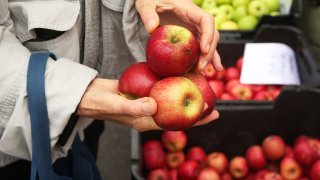
The organic food industry is a booming business, with sales surging last year by 12.4% to $61.9 billion. However, most people don't know what "organic" really means.
In 2014, brand consultancy BFG surveyed 300 shoppers. Of those shoppers, 70% purchased organic food, but only 20% of respondents could define organic.
STAY IN THE KNOW
Watch NBC10 Boston news for free, 24/7, wherever you are. |
|
Get Boston local news, weather forecasts, lifestyle and entertainment stories to your inbox. Sign up for NBC Boston’s newsletters. |
According to the USDA, "organic is a labeling term that indicates that the food or other agricultural product has been produced through approved methods." In other words, "organic" by itself isn't necessarily a health claim. It just means the food was produced using organic methods. These methods include a list of federal standards addressing things like soil fertility, pest and weed control and animal raising practices.
Some health-conscious consumers gravitate toward organic over conventional products due to concerns about highly processed foods, artificial ingredients, as well as the effects of pesticides, hormones and antibiotics. According to a study by Pew Research, 76% of adults surveyed bought organic foods for their health value, followed by environmental concerns at 33% and convenience at 22%.
Get top local stories in Boston delivered to you every morning. Sign up for NBC Boston's News Headlines newsletter.
But there is conflicting data about whether organic foods are actually healthier and safer. For example, a 2005 report from the University of California Riverside suggests that pesticide residue in organic and conventional crops is too low to have any adverse effects on health. Many experts also agree there's no significant nutritional difference between organic and conventional crops.
To be sure, experts agree the organic food industry is here to stay.




